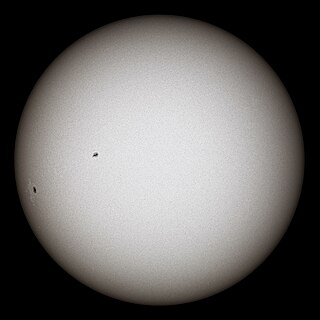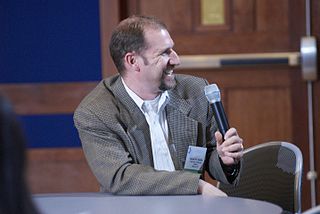Epistemology is the branch of philosophy concerned with knowledge. It studies the nature, origin, and scope of knowledge, epistemic justification, and various related issues. Debates in contemporary epistemology are generally clustered around four core areas:

Interdisciplinarity or interdisciplinary studies involves the combination of multiple academic disciplines into one activity. It draws knowledge from several fields like sociology, anthropology, psychology, economics, etc. It is related to an interdiscipline or an interdisciplinary field, which is an organizational unit that crosses traditional boundaries between academic disciplines or schools of thought, as new needs and professions emerge. Large engineering teams are usually interdisciplinary, as a power station or mobile phone or other project requires the melding of several specialties. However, the term "interdisciplinary" is sometimes confined to academic settings.
The philosophy of education is the branch of applied philosophy that investigates the nature of education as well as its aims and problems. It also examines the concepts and presuppositions of education theories. It is an interdisciplinary field that draws inspiration from various disciplines both within and outside philosophy, like ethics, political philosophy, psychology, and sociology. Many of its theories focus specifically on education in schools but it also encompasses other forms of education. Its theories are often divided into descriptive theories, which provide a value-neutral description of what education is, and normative theories, which investigate how education should be practiced.
Science education is the teaching and learning of science to school children, college students, or adults within the general public. The field of science education includes work in science content, science process, some social science, and some teaching pedagogy. The standards for science education provide expectations for the development of understanding for students through the entire course of their K-12 education and beyond. The traditional subjects included in the standards are physical, life, earth, space, and human sciences.
Instructional scaffolding is the support given to a student by an instructor throughout the learning process. This support is specifically tailored to each student; this instructional approach allows students to experience student-centered learning, which tends to facilitate more efficient learning than teacher-centered learning. This learning process promotes a deeper level of learning than many other common teaching strategies.

Active learning is "a method of learning in which students are actively or experientially involved in the learning process and where there are different levels of active learning, depending on student involvement." Bonwell & Eison (1991) states that "students participate [in active learning] when they are doing something besides passively listening." According to Hanson and Moser (2003) using active teaching techniques in the classroom can create better academic outcomes for students. Scheyvens, Griffin, Jocoy, Liu, & Bradford (2008) further noted that "by utilizing learning strategies that can include small-group work, role-play and simulations, data collection and analysis, active learning is purported to increase student interest and motivation and to build students ‘critical thinking, problem-solving and social skills". In a report from the Association for the Study of Higher Education, authors discuss a variety of methodologies for promoting active learning. They cite literature that indicates students must do more than just listen in order to learn. They must read, write, discuss, and be engaged in solving problems. This process relates to the three learning domains referred to as knowledge, skills and attitudes (KSA). This taxonomy of learning behaviors can be thought of as "the goals of the learning process." In particular, students must engage in such higher-order thinking tasks as analysis, synthesis, and evaluation.
A concept inventory is a criterion-referenced test designed to help determine whether a student has an accurate working knowledge of a specific set of concepts. Historically, concept inventories have been in the form of multiple-choice tests in order to aid interpretability and facilitate administration in large classes. Unlike a typical, teacher-authored multiple-choice test, questions and response choices on concept inventories are the subject of extensive research. The aims of the research include ascertaining (a) the range of what individuals think a particular question is asking and (b) the most common responses to the questions. Concept inventories are evaluated to ensure test reliability and validity. In its final form, each question includes one correct answer and several distractors.
Experimental philosophy is an emerging field of philosophical inquiry that makes use of empirical data—often gathered through surveys which probe the intuitions of ordinary people—in order to inform research on philosophical questions. This use of empirical data is widely seen as opposed to a philosophical methodology that relies mainly on a priori justification, sometimes called "armchair" philosophy, by experimental philosophers. Experimental philosophy initially began by focusing on philosophical questions related to intentional action, the putative conflict between free will and determinism, and causal vs. descriptive theories of linguistic reference. However, experimental philosophy has continued to expand to new areas of research.
Standpoint theory, also known as standpoint epistemology, is a foundational framework in feminist social theory that examines how individuals' unique perspectives, shaped by their social and political experiences, influence their understanding of the world. Standpoint theory proposes that authority is rooted in individuals' personal knowledge and perspectives and the power that such authority exerts.
Physics education or physics teaching refers to the education methods currently used to teach physics. The occupation is called physics educator or physics teacher. Physics education research refers to an area of pedagogical research that seeks to improve those methods. Historically, physics has been taught at the high school and college level primarily by the lecture method together with laboratory exercises aimed at verifying concepts taught in the lectures. These concepts are better understood when lectures are accompanied with demonstration, hand-on experiments, and questions that require students to ponder what will happen in an experiment and why. Students who participate in active learning for example with hands-on experiments learn through self-discovery. By trial and error they learn to change their preconceptions about phenomena in physics and discover the underlying concepts. Physics education is part of the broader area of science education.

Chemistry education is the study of teaching and learning chemistry. It is one subset of STEM education or discipline-based education research (DBER). Topics in chemistry education include understanding how students learn chemistry and determining the most efficient methods to teach chemistry. There is a constant need to improve chemistry curricula and learning outcomes based on findings of chemistry education research (CER). Chemistry education can be improved by changing teaching methods and providing appropriate training to chemistry instructors, within many modes, including classroom lectures, demonstrations, and laboratory activities.
Patricia A. Alexander is an educational psychologist who has conducted notable research on the role of individual difference, strategic processing, and interest in students' learning. She is currently a university distinguished professor, Jean Mullan Professor of Literacy, and Distinguished Scholar/Teacher in the Department of Human Development and Quantitative Methodology in the College of Education at the University of Maryland and a visiting professor at the University of Auckland, New Zealand.

Scientific misconceptions are commonly held beliefs about science that have no basis in actual scientific fact. Scientific misconceptions can also refer to preconceived notions based on religious and/or cultural influences. Many scientific misconceptions occur because of faulty teaching styles and the sometimes distancing nature of true scientific texts. Because students' prior knowledge and misconceptions are important factors for learning science, science teachers should be able to identify and address these conceptions.
Inquiry-based learning is a form of active learning that starts by posing questions, problems or scenarios. It contrasts with traditional education, which generally relies on the teacher presenting facts and their knowledge about the subject. Inquiry-based learning is often assisted by a facilitator rather than a lecturer. Inquirers will identify and research issues and questions to develop knowledge or solutions. Inquiry-based learning includes problem-based learning, and is generally used in small-scale investigations and projects, as well as research. The inquiry-based instruction is principally very closely related to the development and practice of thinking and problem-solving skills.
Scientific literacy or science literacy encompasses written, numerical, and digital literacy as they pertain to understanding science, its methodology, observations, and theories. Scientific literacy is chiefly concerned with an understanding of the scientific method, units and methods of measurement, empiricism and understanding of statistics in particular correlations and qualitative versus quantitative observations and aggregate statistics, as well as a basic understanding of core scientific fields, such as physics, chemistry, biology, ecology, geology and computation.
Learning analytics is the measurement, collection, analysis and reporting of data about learners and their contexts, for purposes of understanding and optimizing learning and the environments in which it occurs. The growth of online learning since the 1990s, particularly in higher education, has contributed to the advancement of Learning Analytics as student data can be captured and made available for analysis. When learners use an LMS, social media, or similar online tools, their clicks, navigation patterns, time on task, social networks, information flow, and concept development through discussions can be tracked. The rapid development of massive open online courses (MOOCs) offers additional data for researchers to evaluate teaching and learning in online environments.
Thomas S. Popkewitz is a professor in the department of curriculum and instruction, University of Wisconsin–Madison School of Education, US. His studies explore historically and contemporary education as practices of making different kinds of people that distribute differences. He has written or edited approximately 40 books and 300 articles in journals and book chapters translated into 17 languages. Recent studies focus on the comparative reason of educational research as cartographies and architectures that produce phantasmagrams of societies, population and differences. The studies entail theoretical, discursive, ethnography, and historical studies that explore school, professional identities, and the relation to conceptions of differences inscribed childhood, learning and cultural differences.

David Williamson Shaffer is the Vilas Distinguished Achievement Professor of Learning Science at the University of Wisconsin–Madison in the department of Educational Psychology, the Obel Foundation Professor of Learning Analytics at Aalborg University in Copenhagen, a Data Philosopher at the Wisconsin Center for Education Research, and Principal of EFGames, LLC.

The Technological Pedagogical Content Knowledge (TPACK) framework is an educational model that describes the intersections between technology, pedagogy, and content for the effective integration of technology into teaching. TPACK became popular in the early 2000s.

Decolonization of knowledge is a concept advanced in decolonial scholarship that critiques the perceived hegemony of Western knowledge systems. It seeks to construct and legitimize other knowledge systems by exploring alternative epistemologies, ontologies and methodologies. It is also an intellectual project that aims to "disinfect" academic activities that are believed to have little connection with the objective pursuit of knowledge and truth. The presumption is that if curricula, theories, and knowledge are colonized, it means they have been partly influenced by political, economic, social and cultural considerations. The decolonial knowledge perspective covers a wide variety of subjects including philosophy, science, history of science, and other fundamental categories in social science.






